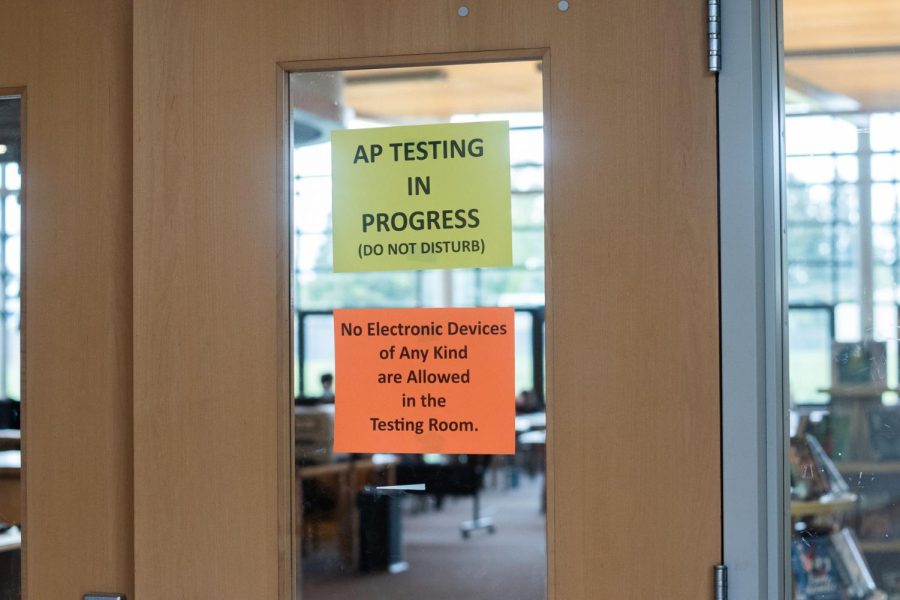AP Places Exams Over Experience
AP testing takes place in the La Salle library, where signs are posted on the doors to warn students and faculty to stay away.
May 11, 2022
This whole year has felt like a race.
In AP classes, we have been racing to get through all the material and racing to get the highest grade.
The rigid curriculum of Advanced Placement (AP) courses creates a memorization-based system that is not applicable to real-world learning and development.
As a junior, the stress has been consistently building up all year — and all of the stress has been centered around the weeks of May 2-6 and the following week of May 9-13.
All year, AP classes teach the curriculum of the College Board in order to prepare students for one test at the end of the year. The clock starts ticking from the first day of school, from the very first assignment to the last few seconds of the exam itself.
Through my experience of beginning this year with four AP classes, and then reducing that amount to three due to the toll it took on my mental health, I have realized the importance of comprehension of academic content. It is extremely difficult to muster the motivation to learn and to understand when the only goal of your learning seems to be to pass a single test.
The transition from four AP classes to three was a result of an overwhelming amount of stress that took a toll on my mental health. It felt like the stream of schoolwork was never-ending. Every time I felt like I was finished with the stress of one test and had time to take a breath, the next one was right around the corner.
However, many people see AP courses and exams as a way to prepare for the rigorous course expectations of college — and they’re not wrong, as AP classes do make students become accustomed to a rigorous course load. Students who do take part in AP courses in high school have shown to be more successful in college.
The problem is with the AP system.
I would like to make it clear that the teachers who lead us through these courses are not the problem. I am extremely appreciative of the time and effort that the AP teachers here at La Salle put into the classes they teach.
However, for some students, AP classes do not offer an environment in which students are able to grow in their understanding. Instead, they create a scale of expectations to match up against. When tests are so difficult that failure is an expected outcome, what kind of impact does that have on the mindset of students?
From my own experience this year, it didn’t really make me feel too great.
The course material for any AP class is overwhelming and heavy, which is a huge factor in having to race through and memorize material, rather than fully comprehending what is being taught.
In my opinion, it is more valuable to have a well-rounded knowledge of academic material than to score highly on a test. Even if a student does manage to succeed in the course itself, the sort of defining factor of success is the AP test itself. If a student takes AP classes for college credit and earns a 3, which is a passing grade, some colleges won’t accept it, which could mean that the student has to take the course again.
It can be difficult to see the value in pushing yourself academically when faced with an overwhelming amount of dense material and high expectations to succeed. The environment brought on by AP classes does help prepare students for college, but for some, it brings more anxiety and stress than it brings the knowledge of advanced topics.





